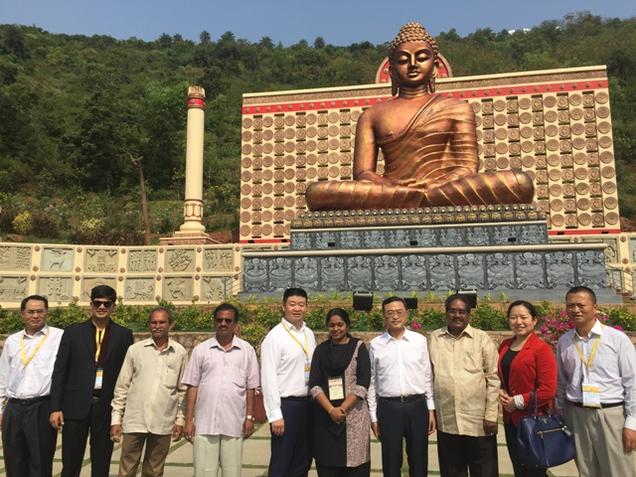
“Love Indian culture more than Indians do. Do not impose, but align with the flow. Change only what you can.”
An infra company based in the southwest province of Guizhou — known for its role in Mao Zedong’s Long March — has emerged as one of the prime investors in Andhra Pradesh, showcasing the role of Chinese provinces and Indian States in driving a new phase of India-China ties.
The Guizhou International Investment Corporation (GIIC) is undertaking the Detailed Master Plan for infrastructure in Amaravati, Andhra’s new capital, and Chief Minister Chandrababu Naidu’s pet project.
Geography has played a major role in turning GIIC into an infra heavyweight. Extensive tunnelling, bridge construction and power generation was required for lifting development in coal-rich Guizhou — a province mostly known for its hills and hollows. The company became well known for building a tunnel that established Guizhou’s new link with the famed Stilwell road, which once routed military supplies to Chongqing from India during World War II. The Stilwell road is now the backbone of the proposed Bangladesh-China-India-Myanmar (BCIM) economic corridor.
In a freewheeling conversation with The Hindu, Zhang Zhao, vice-chairman of the GIIC explained how Chinese companies were teaming up for a deeper economic engagement with India. “A symbiotic relationship has indeed emerged between China and India. Chinese companies have developed capacities, out of their own reform experience, which India requires,” says the GIIC’s Chief Executive Officer (CEO). But, Mr. Zhang stressed that understanding and appreciating each other’s distinct business cultures is also an equally formidable barrier.
As a result his message to his employees and Chinese partners is to engage India with humility and respect, rooted in Confucian principles. “Love Indian culture more than Indians do. Do not impose, but align with the flow. Change only what you can,” Mr. Zhang observed. Consequently, the company and its partners are consciously aligning with New Delhi’s flagship Make-in-India campaign to channel investment flows.
Like many others in Guizhou’s business circles, Mr. Zhao draws inspiration from Wang Yangmin. The fifteenth century philosopher and practitioner stretched the Confucian tradition to emphasise that theoretical knowledge was useless without its application to resolve real-life problems. Another revered figure is Deng Xiaoping, the architect of reforms, who guided China out of the trauma of Mao’s Cultural Revolution.
The GIIC’s forays in Andhra have triggered a “collegiate approach” among Chinese businesses, wanting to invest in India. “We cannot do everything ourselves. For example we need partners in the development of ports, which Andhra requires, or real estate, which has not been our expertise. So we looked for allies within and outside Guizhou, and our effort to build teams have yielded satisfactory results,” observes Binod Singh, a senior advisor to GIIC.
The synergetic approach, pursued by local Chinese enterprises, is already making headway in India. Negotiations have reached an advanced stage between the Guizhou Kailin Group and India’s Coromandel International Limited for establishing a $1 billion fertilizer plant in the Kakinada Special Economic Zone.
Real estate investment in India could ride on the model of Garland City, a massive undertaking of “affordable housing” in Guiyang, where four lakh people reside in a dense, but neatly planned cluster of vertical structures. “This is the scale of operations that India needs and we are ready for it,” says Mr. Zhao, scanning the area, with considerable pride, from the rooftop of a 72 floor building that towers over the City. The project is the result of a partnership between the Guizhou Architecture Institute, and the China State Construction Engineering Corporation (CSCEC), the state-owned civil engineering giant.
The Chinese consortium approach could also work in the development of a building-material park in the Vijayawada airport area, which could cater to the bulk of Andhra’s construction material needs, says Mr. Singh.
Analysts point out that growing tie between Guizhou and Andhra Pradesh demonstrate the rise of Chinese provinces and Indian states as the core drivers of Sino-Indian ties. Earlier in a conversation with The Hindu, former Indian ambassador to China Ashok Kantha acknowledged that New Delhi-Beijing ties were being rapidly decentralised. “Chief Ministers are taking ownership of the relationship with China. New projects are coming up, and specific initiatives are being taken,” he observed.
source: http://www.thehindu.com / The Hindu / Home> National / by Atul Aneja / Guiyang (SouthWest China) – June 05th, 2016